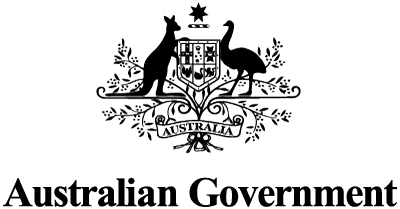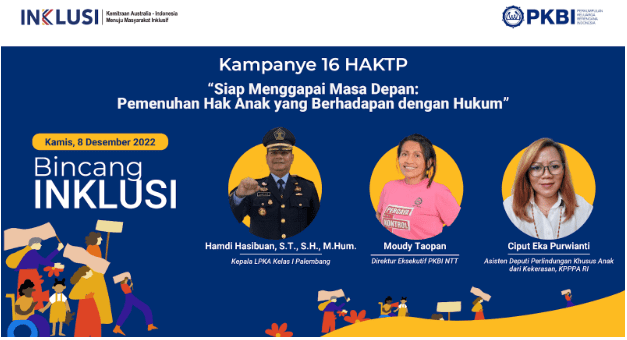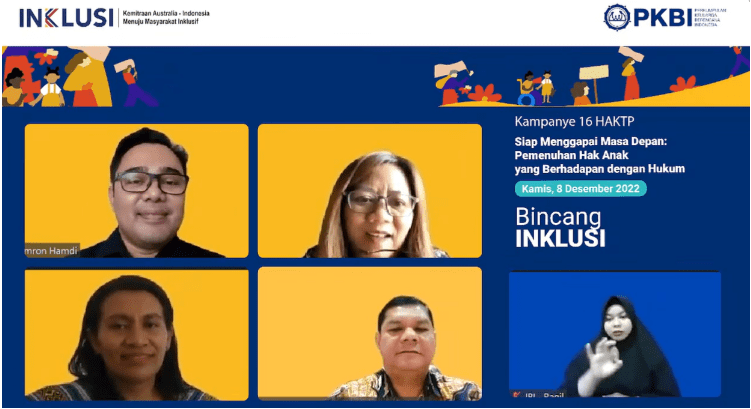Jakarta – To mark World Human Rights Day 2022, INKLUSI joined with the Indonesian Family Planning Association (PKBI) to host a talk show titled ‘Seize the Future: Fulfillment of the rights of Children in Conflict with the Law’.
Children who find themselves in conflict with the law is an important issue for INKLUSI, especially in relation to empowering vulnerable groups to access services and protection from violence. These children can be the perpetrators, victims or witnesses of crimes. Between 2016 and 2020, the Indonesian Child Protection Commission (KPAI) recorded 655 children who had to face the law for being perpetrators of violence. From this number, 506 children had committed physical violence and 149 children had committed psychological violence.
Based on this data, children are a vulnerable group in need of protection, particularly if their social environment is one that increases the risk of them becoming either the victim or the perpetrator of violence.
The talk show discussed how to fulfill the rights of children who are in conflict with the law. Three guests were invited to share their perspectives: Hamdi Hasibuan, Chair of Class 1 LPKA (Juvenile Correctional Center) Palembang, South Sumatra; Ciput Eka Purwianti, Assistant Deputy for Special Protection of Children from Violence KPPPA RI; and Moudy Taopan, Executive Director of PKBI NTTT. Alumni of the Kupang LPKA also shared their experience of serving out their sentences at the LPKA.
Legal Protection for Children in Conflict with the Law
The Indonesian Government, under the Ministry of Law and Human Rights, has issued several regulations related to children in conflict with the law. Law Number 11 of 2012 concerning the Children Criminal Justice System (UU SPPA) aims to guarantee the best protection for children who are in conflict with the law, covering all judicial processes – from investigations to guidance after serving a sentence. This includes coaching, parenting, fulfillment of good clothing and food, health services, access to education, skills development and psychological guidance. The law is also designed to ensure all judicial processes are free from violence and uphold the dignity of children.
Moudy Taopan said many issues are still faced by children in conflict with the law as perpetrators, victims, or witnesses.
“We must admit that a great number of children’s rights violations still happen, from the judicial process until the child is put into LPKA,” Moudy said.
According to PKBI’s observation, child perpetrators of crimes often encounter verbal abuse during the judicial process and receive unjust sentences. In addition to that, children in conflict with the law often have their identities revealed with names, address and faces published. This not only puts the child’s safety at risk during their time at LPKA, but impacts the child’s life after serving their time.
Moudy added that some views lead to the violation of the rights of children in conflict with the law. That includes many officers who don’t approach their work with a children’s rights perspective. Another challenge is inadequate access to the human resources needed for child development.
Ciput Eka Purwianti, Assistant Deputy for Special Protection for Children from Violence of the Ministry of Women’s Empowerment and Child Protection, said that UU SPPPA carries a restorative justice principle, which is a process to restore and rehabilitate children.
Every child in the judicial process has the right to be treated humanely, to be protected, to have their needs taken care of according to their age and development, so they can proceed to have a better life,
Ciput said.
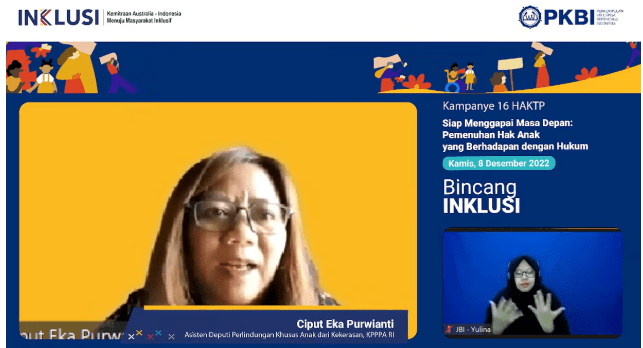
Ciput added that children should be guaranteed freedom from any kind of abuse, cruel punishment, and inhumane treatment that demeans their dignity. Children have the right to engage in activities that support their growth and development, such as recreational activities, skills development, proper education, and health services for physical and psychological wellbeing.
Good Practices of Rights Fulfillment at LPKA
The implementation of UU SPPA must be carried out by all government officials, especially all LPKA officers. Since 2019, PKBI, through INKLUSI, has focused on the fulfillment of rights for children in conflict with the law at 13 LPKA in 13 provinces, namely: Jakarta Special Capital Region, West Java, Central Java, East Java, South Sumatra, Bengkulu, Jambi, Lampung, West Kalimantan, South Kalimantan, Central Kalimantan, South Sulawesi and East Nusa Tenggara.
Palembang, South Sumatra LPKA Class 1 and Kupang NTT LPKA offer examples of good implementation practices.
Hamdi Hasibuan, the Head of Palembang LPKA, shared some of the policies implemented to guide the children at his LPKA. Activities at the LPKA are conducted with a child-friendly and humane approach to keep children from feeling constrained.
“To prevent them from feeling restricted, staying at LPKA is not a prison, but a place for fostering. The officers here do their jobs by applying a humane approach and being cheerful when dealing with the children,” said Hamdi.
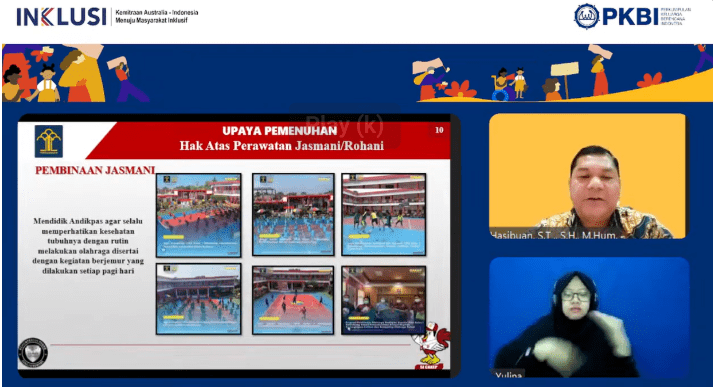
Some of the activities carried out by LPKA Palembang include religious counselling, education, scout activities, physical fitness and health rights, proper food, recreation, visits, remissions, integrations and reading. LPKA Palembang also provides skills development activities for Andikpas (children of LPKA) so that they can generate income after leaving LPKA. This includes computer skills, electrical installation, printing, making Palembang songket, gardening, bird breeding, and various sports according to their interests and talents.
LPKA in Kupang also implements activities that develop the skills of Andikpas. Yano, an alumnus of LPKA Kupang, shared his story of his time as Andikpas. He learned various skills, such as handicrafts, photography and hairdressing.
“I learned how to use traditional fabric from NTT to create handicraft products, such as bracelets, frames from newspapers, and cardboard. Essentially, utilising items that are available to produce handicrafts,” Yano said.
The students are also given the opportunity to engage in activities outside the LPKA. With PKBI, they receive lessons in photography, hairdressing, and can join activities held by NTT Province Vocational Training Centre (Balai Latihan Kerja/BLK) and receive the qualifications needed to work in a related field after leaving LPKA.
“I received training at a barber shop. PKBI provided the venue for the training, and we were trained until we truly mastered it. LPKA also cooperates with the NTT Provincial BLK, and I was selected for hairdressing training. I then received a certificate from the provincial government,” Yano added.
Juan and Andi, Yano’s peers at Kupang LPKA, also learnt some useful skills. Juan received gardening training from BLK.
“Back then, we received different training. Yano learned barber skills, meanwhile I attended gardening class at BLK,” said Andi.
Juan also expressed his excitement about the various activities and skills he participated in. He considered the activities a consolation that provided hope and encouragement for him.
“These kinds of activities were a consolation for us during our time at the LPKA,” Juan said.
The Challenges Encountered by Children at LPKA
Despite the positive activities delivered for the children at LPKA, they still face many challenges. According to Hamdi Hasibuan, the children placed into LPKA are of school-age. Therefore, it is important to focus on the continuity of their education.
“They have to stay in school and focus on their education. After they leave, they need that education so they can compete with the community outside,” said Hamdi.
Hamdi said that several Palembang LPKA alumni are now working as employees of the Ministry of Law and Human Rights as they earned sufficient formal education degrees. For that reason, it demonstrates the importance of education, especially for children at LPKA.
Population administration is another challenge. According to Hamdi, some students do not have an identity document. LPKA needs to work with the Department of Population and Civil Registration to support students to obtain their identification documents.
Another challenge is related to family. Many students are neglected by their families after their time in LPKA. Consequently, this leads to compromised mental health and the need for psychological counselling.
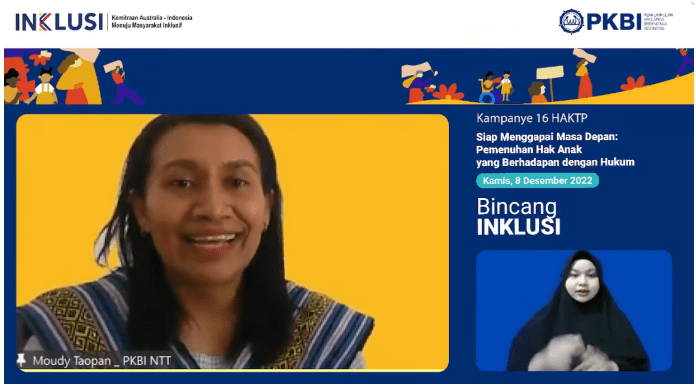
According to Moudy Taopan, a long judicial process also affects children’s mental health. Therefore, through INKLUSI, PKBI provides counselling services to support psychological recovery.
Ciput Eka Purwianti from the Ministry of Women Empowerment and Child Protection added that the hardest challenge actually comes when the children leave LPKA. She said children can find that their parents are not yet prepared to accept them back once they return to the family, or that routines have changed at home. Therefore, reintegration or adjustment to the new norms in the family is needed.
“Children’s environment has an impact on their behaviour. There’s a risk of recidivism that actually can be avoided with family support, parenting, and an encouraging environment. If not reintegrated, children could repeat (their crime),” said Ciput.
Forging Dreams, Creating Future
Fulfillment of the rights of children in conflict with the law needs to involve the community and support from all relevant stakeholders. Ciput Eka Purwianti said that synergy between the national government and regional governments is very important. For this reason, KPPPA RI continues to direct the government at the regional level to participate in carrying out social reintegration of children in conflict with the law, in order to protect them from an environment that risks turning them into victims or perpetrators.
“We continue to move to direct local governments to participate in the social reintegration of children in conflict with the law, from prevention efforts to counter-measures,” said Ciput.
Along with this, PKBI, through their Youth Centre network, is conducting intensive socialisation and building communication with the public, government, and the private sector. These various collaborative programs enable opportunities for a better future for Andikpas, in order to create an inclusive environment.
“PKBI believes in the power of collaboration. The hope is that we can collaborate and create safe and inclusive spaces wherever we are,” said Moudy.
With the skills he received while at LPKA Kupang, Yano was able to work as a barber at a prestigious barber shop for two years. Currently he is a cashier at a well-known supermarket in Kupang. Meanwhile, Juan and Andi are still pursuing their careers by working various jobs, such as a mechanic, ship crew, and other jobs that utilise the skills they have. Thanks to the skills they obtained, they can also assist with family expenses.
Yano, Juan and Andi are examples of LPKA alumni who have rekindled their hopes for a better future. The judicial process they went through and their experience in LPKA became important life lessons. They hope that Andikpas will be treated fairly according to the law and well-accepted by the community to ensure they have a better future.


